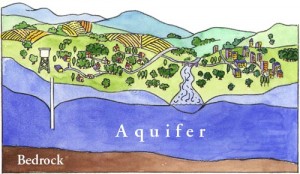From the Psalter:
I lift up my eyes to the hills; from where is my help to come?
(From the Daily Office Lectionary – Psalm 121:1 (BCP Version) – August 19, 2014)
 I love Psalm 121 for a variety of reasons. It is the psalm which the sanctoral lectionary provides for the feast of St. Francis of Assisi (October 4), always a favorite saint. It is the psalm my late mother chose to be read at her funeral. It is one of the psalms of ascent which pilgrims to the Temple are believed to have sung as they made their way to Jerusalem for the major festivals of ancient Judaism; on pilgrimage in Israel and Palestine, my wife and I recalled it as we rode in a travel coach from Ben Gurion Airport in Tel Aviv to ancient city. There many good memories, some joyful, some sad, all meaningful, associated with it.
I love Psalm 121 for a variety of reasons. It is the psalm which the sanctoral lectionary provides for the feast of St. Francis of Assisi (October 4), always a favorite saint. It is the psalm my late mother chose to be read at her funeral. It is one of the psalms of ascent which pilgrims to the Temple are believed to have sung as they made their way to Jerusalem for the major festivals of ancient Judaism; on pilgrimage in Israel and Palestine, my wife and I recalled it as we rode in a travel coach from Ben Gurion Airport in Tel Aviv to ancient city. There many good memories, some joyful, some sad, all meaningful, associated with it.
Its first verse seems particularly appropriate this week as the world has come through and continues to experience the tragedy of conflict in Gaza, the carnage that is the on-going fighting in Iraq, and the violence that has erupted in Ferguson, Missouri. I can imagine people on every side of every one of those situations lifting their eyes and wondering where help is going to come from.
Help, the psalm assures us, comes from the Lord, “the maker of heaven and earth.” But I sometimes think that many (if not most) find that about as helpful as Job did: “Oh, that I knew where I might find him . . . If I go forward, he is not there; or backward, I cannot perceive him; on the left he hides, and I cannot behold him; I turn to the right, but I cannot see him.” (Job 23:3a,8-9) We live in a world where people do not know where to find God, do not know where to look for strength.
I would suspect that most who acknowledge the objective reality of God when asking the question posed in this psalm look for help “out there somewhere” hoping to find God swooping in like Superman bounding tall buildings, or more disturbingly like American bombers defending an Iraqi dam. On the other hand, those who deny the reality of God either don’t bother to look at all or (more commonly) also look “out there somewhere” expecting never to see anything.
A few, however, will know that (as St. Bernard de Clairvaux observed) our spiritual nourishment comes from the place where we think, pray and work, that we begin our spiritual journey where we are and not somewhere else. Moses promised his people that God was bringing them “into a good land, a land with flowing streams, with springs and underground waters welling up in valleys and hills,” (Dt 8:7) and while that may have been the promise of real and tangible place it is also a metaphor for the spiritual reality of God’s help and strength. Jesus told the Samaritan woman at Jacob’s Well that he would give those who asked the water of life which would become in them “a spring of water gushing up to eternal life.” (Jn 4:14)
God’s help, God’s strength, God’s spirit is like an aquifer underlying the soil of our lives. We tap that help and strength by going within, by searching the core of our being, not by looking “out there somewhere.” Yes, like the psalmist, we lift up our eyes to hills as we wonder where to find help, but we must turn our gaze around to actually discover it.
Certainly the people of Gaza, Iraq, and Missouri are right to look for help from outside, but such help is contingent and temporary; it cannot produce any real, lasting, long-term solution. Real change will only come when all people look deep within and tap that spiritual aquifer to which we all have access, that underground stream of living water, that spring of eternal life which has been promised all along.
From where is my help to come? From the Lord, deep within not “out there somewhere.”
====================
A request to my readers: I’m trying to build the readership of this blog and I’d very much appreciate your help in doing so. If you find something here that is of value, please share it with others. If you are on Facebook, “like” the posts on your page so others can see them. If you are following me on Twitter, please “retweet” the notices of these meditations. If you have a blog of your own, please include mine in your links (a favor I will gladly reciprocate). Many thanks!
====================
Father Funston is the rector of St. Paul’s Episcopal Church, Medina, Ohio.



Leave a Reply